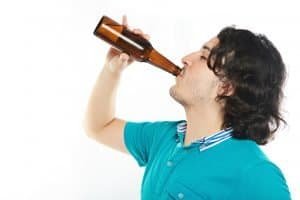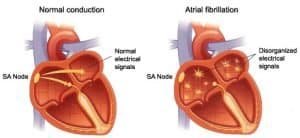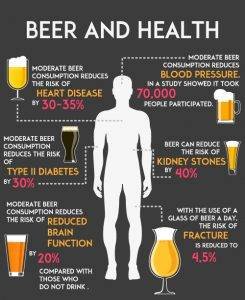The short answer to how long does alcohol stay in your system is one hour per one ounce of alcohol consumed. The liver processes one ounce of pure alcohol in sixty minutes, on average, and a standard drink contains 0.6 ounces of alcohol. Standard drinks include 12 oz. of beer, 8 oz. of malt liquor, 5 oz. of wine, or 1.5 oz. of liquor. Also, the more you drink, the longer alcohol stays in your system. With every drink, more time is added onto the end of however long the previous drink stays in your system.
For example, if you drink one beer at 5:00, your system will be clear by 6:00. If you drink one beer at 5:00 and then another at 5:30, your system will not be clear until 7:00. You will have a half-hour left from drink one, and then an additional hour for drink two.
How Alcohol is Detected in the Body
Alcohol is detected within ones body by the BAC, Blood Alcohol Content. This is done through three standard test; a urine based test, blood based test, and breathalyzer tests. The reasoning we follow individuals BAC is to ensure their safety and the safety of others when the individual under the affect of alcohol is operating a motor vehicle or heavy machinery.
One standard drink raises the average person’s blood alcohol content (BAC) to 0.015% and likely will not intoxicate. Regardless of weight, height, race, sex, or any other attribute other than a liver-affecting disease, everybody’s liver processes alcohol at this rate. If and when someone drinks faster than the liver can process, the alcohol gets absorbed into your blood and tissues, your BAC rises, and intoxicating effects start to occur.
The following offers an estimated range of how long alcohol stays in your blood, urine and saliva:
- Saliva test: One to five days
- Blood test: 12 hours
- Urine test: Three to five days via Ethyl Gluconoride (EGT) metabolite
- Breathalyzer test: Up to 24 hours
This answers the question of how long does alcohol stay in your system, but it is the short answer.
Start exploring addiction rehabs
- Free & confidential helpline
- Connect with an expert rehab advisor
- Understand and review treatment options
How long does alcohol stay in your system?
The long answer for how long does alcohol stay in your system consists of knowing what happens to an alcoholic beverage from start to finish.
We’re just going to follow a beer, from the first sip to completely out of your system. This ‘journey’ will represent the consumption of one beer only. After this section we will discuss a few other factors when dealing with alcohol staying in the system, such as the dangers of over consumption and the effects alcohol has on the body even after it is completely out of your system.
We’ve Helped Thousands of Individuals Overcome Drug and Alcohol Addiction
The Journey Of a Beer

Stop 1: The stomach
Once the beer arrives in your stomach, absorption through the stomach lining and into the bloodstream occurs. (Only about one-third of the alcohol will be dispersed this way. The other two-thirds we will follow next). This is very different from how food is processed in the stomach. Food must be digested before it can begin spreading throughout your body. On the other hand, alcohol absorption begins rather quickly. In the stomach, a few factors change how quickly this happens. One drink can in fact remain in the system for up to three hours.
Stronger drinks, such as shots, are absorbed more quickly. This is due to the low volume of liquid but high volume of alcohol. Also, the amount of food in the stomach at the time can slow down or speed up the alcohol absorption rate. The more food that is present, the slower alcohol finds its way into the blood, at least from the stomach. Remember this only happens for one-third of the alcohol. The rest heads to the small intestine, where it will continually be absorbed into the blood through the walls of the intestine. Blood is the main transporter of alcohol. The journey has just begun. (Source: California Drug Rehab)
Stop 2: The Brain
It isn’t that liquid alcohol floods your skull and washes your brain. It’s that the brain is the first organ to feel the effects of alcohol once it is fully absorbed into your bloodstream. There is physical contact between the brain and the alcohol; brain cells absorb alcohol through the blood barrier. However, the amount is extremely lower than how much was in your stomach and/or small intestine.
Your brain functions become increasingly impaired as your BAC grows. Three main areas of the brain are affected: the cerebral cortex, the limbic system, and the cerebellum. Alcohol is a depressant, meaning it slows the functions of the brain down.
Cerebral Cortex
This is the command center of the brain. All thoughts begin here and are processed into ideas, actions, etc. Once depressed by the alcohol, the following effects are felt: increased talkativeness, increased feelings of self-confidence, less inhibition, poor judgement, blurred vision, distorted hearing, and a higher tolerance to physical pain. All of this is because the alcohol is diminishing the brain’s ability to process information.
Limbic System
This is the emotional and memory-making factory of the brain. If you’ve ever been intoxicated on alcohol, you may have told a friend a little too loudly how much you love him or her. You also may have forgotten portions of your night. This is because of the depression of the limbic system. Emotional balance restores itself without incident once alcohol wears off, but with memory the case is not the same. In fact, aside from blacking out, studies show alcohol can damage the brain’s ability to create new memories. Long-term alcoholism can lead to a form of amnesia called Wernicke-Korsakoff syndrome.
Cerebellum
This is the muscle-movement coordination section of the brain. Feeling off-balance and having difficulty walking straight happen when alcohol depresses the cerebellum. Research shows that the cerebellum may also contribute to the function of verbal learning, word production, solving problems, and planning. According to this research, “cerebellar degeneration is common in alcoholics,” and “cell death may cause permanent loss of function…” Alcohol may damage the brain worse than we thought.
Stop 3: The Heart
Unlike with the brain, where tiny amounts of alcohol are absorbed into brain cells, the heart does not receive any physical alcohol. However, the effects alcohol has on the heart are strong. Among many things, alcohol is a ‘vasodilator,’ which means it causes the body’s blood vessels to dilate. This means more blood is flowing through the body, but lowers blood pressure overall. Therefore, to make up for any possible lack of blood flow, the heartbeat increases. (This is why your skin can appear flushed and be sweaty when consuming alcohol).

This isn’t all alcohol can do to the heart. Excessive drinking can cause something called atrial fibrillation, (known more as AFib), which consists of an irregular heartbeat and can lead to blood clotting, stroke, heart failure, and/or other heart conditions.
Stop 4: The Kidneys
Kidneys filter blood. Because the alcoholic remainder of your beer is entirely in your blood at this point, the next actual physical stop on our journey is your pair of kidneys. Here, waste is separated from useful nutrients and proteins. The alcohol is processed through the kidneys and then stays in the bloodstream (until later, as we will see).
The secondary function of your kidneys is to balance the amount of water in your system. Alcohol affects the kidney’s ability to do this. This is because alcohol is a ‘diuretic,’ again, among many other things. Diuretics increase the amount of urine inside of the body. (This, combined with the increased heart rate alcohol causes, is why exercise while drinking is never recommended).
Because urine is mostly water, and alcohol makes you pee a lot, dehydration is a very likely occurrence when drinking. Dry mouth, headache, nausea, fatigue, and that nasty hangover in the morning can call be caused by this dehydration that starts in the kidneys.
Stop 5: The Bladder
Believe it or not, the bladder is not the last stop on the journey of your beer. The reason you have to urinate often while drinking is because alcohol slows the production of vasopressin, a hormone in the kidneys that reabsorbs water which would otherwise end up in the bladder. A normal amount of vasopressin ensures that the water going to the bladder is useless to the body, waste. When alcohol diminishes vasopressin, the bladder fills with the water from the beer.
Also, when drinking, a higher ethyl glucuronide (EtG) level will be present in urine. EtG is a substance produced when alcohol has been metabolized. This, along with trace amounts of alcohol excreted through urine (less than 10% of total alcohol consumed), is why urinalysis tests can determine whether or not someone has consumed alcohol, usually within the last 48 hours.
Stop 6: The Liver
The rest of the alcohol left in your system is broken down inside the liver. This breaking-down process is known as metabolizing. The vast majority of alcohol exits the body via metabolism in the liver. Once alcohol is fully metabolized, what remains is a chemical called acetaldehyde, which is a toxin. The body rids of acetaldehyde by further metabolizing it to carbon dioxide and water (exhalation and sweat/urination).

As stated in an online journal of the National Institute on Alcohol Abuse and Alcoholism: “Liver injury may be caused by direct toxicity of metabolic by-products of alcohol as well as by inflammation induced by these byproducts. Exposure of liver cells to bacterial toxins may contribute to liver disease. Escalating liver injury can lead to fibrosis and, ultimately, to cirrhosis.”
Last Stop: Hangover Town
The need for the body to replace the water, nutrients, minerals and vitamins it lost through alcohol processing translates to a hangover. Yes, the alcohol may be out of your system, but its effects still linger. You may feel dizzy, lightheaded, disoriented, weak… all of the lovely feelings associated with ‘the morning after.’ What you feel is called a hangover, and there is no definite fix. Drink lots of water, eat healthy, exercise, but in the end, nobody is immune to the effects of alcohol.
Those who are interested in cleansing their body of alcohol, regardless of the reason, have many options for doing so:
- Drink more fluids, with eight cups of water per day recommended
- Fast for one to three days
- Cleanse your liver such as by consuming milk thistle
- Exercise to get rid of toxins
IN CONCLUSION
How long does alcohol stay in your system? If you’re looking for the easy answer, it takes about an hour for the body to fully process one drink. From tipping the glass to stomach absorption, the time is quick, maybe five minutes. From the blood to the brain to the kidneys takes most of the time. Metabolism in the liver is relatively quick, maybe the last ten minutes of the beer’s journey. Then, either through liver metabolism, urination, sweating, or breathing ‘alcohol breath’, the beer’s journey is over. In less than 60 minutes, the body is clear of beer.
Remember, though, that having two drinks in one hour’s time does not mean one hour is needed to clear the system. Each drink takes its own hour. Remember this next time you have to drive home or remain sober for other reasons. Food or coffee will not save your sobriety, only time.
Next article: https://www.quitalcohol.com/alcoholism/health-effects/alcohol-and-doxycycline

